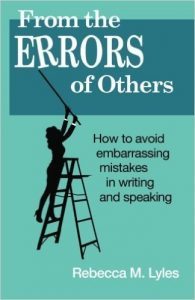That hidden fat
 In this age of body-shaming, no one wants to use words like bony, scrawny, chubby, pudgy, or fat. We say slim, willowy, curvy, big-boned … euphemisms to avoid making people feel awkward about their physiques. But when it comes to writing, almost everyone needs a wakeup call, even if it hurts.
In this age of body-shaming, no one wants to use words like bony, scrawny, chubby, pudgy, or fat. We say slim, willowy, curvy, big-boned … euphemisms to avoid making people feel awkward about their physiques. But when it comes to writing, almost everyone needs a wakeup call, even if it hurts.
Your writing is probably fat. Sorry, but there’s no other word for it. We all use meaningless clichés without even realizing it. They’re part of our conversational vocabularies, and they creep into our writing like midnight refrigerator raids. You ask, “Why should I care? I’m not a swimsuit model – I mean – professional writer!” Perhaps not. But you might write emails, business reports, letters to the editor, announcements, notices, or bulletins for the Cub Scouts.
The trouble with fat writing is that the extra words dilute your message and subtract from its meaning. Readers get bored and stop paying attention.
To guard against releasing fat writing into the world, self-edit before you publish or send. These examples of voluminous verbiage show what to look out for, and what you could say instead:
so on and so forth (so on)
first and foremost (first)
last but not least (last)
over and over and over again (repeatedly)
far and away (clearly)
in some form or fashion (somehow)
And you can usually leave these out altogether:
as a matter of fact
as I said before
at the end of the day
it goes without saying that
for all intents and purposes
to tell you the truth
I know you’re not shallow and it’s not for vanity’s sake. I’m concerned about your health and want you to have a long and successful (writing) life.
So cut out the F-word, fat, and flex those nouns and verbs. Your writing might even make it to the Sports Illustrated cover.
∗∗∗∗∗∗∗ Dear readers ∗∗∗∗∗∗∗
 The last weekly post to this blog will be July 3, 2016. After that, see TextCPR on Facebook for occasional new posts. Thanks for nearly four years of readership and engaging comments.
The last weekly post to this blog will be July 3, 2016. After that, see TextCPR on Facebook for occasional new posts. Thanks for nearly four years of readership and engaging comments.
The spirit of this blog is now captured in a book: From the Errors of Others, available online at these links:
Richard Nordquist, Grammar and Composition expert for About.com, says:
“From the Errors of Others is a refreshing alternative to those heavy handbooks we never opened in school…. Imagine that: a smart book about writing and speaking effectively that people will actually enjoy reading.”



